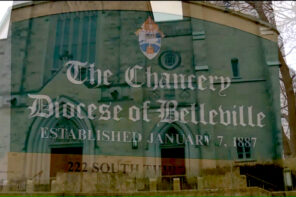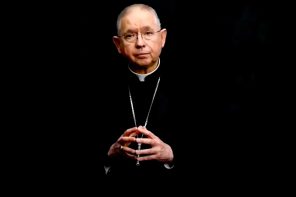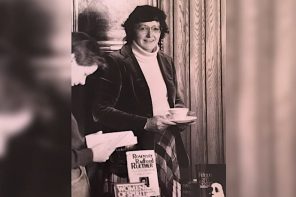Sarah Posner’s excellent analysis of the evangelical schism over the far-right rhetorical fork in the road—Christian nationalism vs. “religious liberty”—dovetails with my own reporting on the radicalization of Catholic voters over the religious liberty meme.
As Posner notes here on RD:
No matter how dubious one might find those religious freedom claims—notably, claims for exemptions from serving same-sex marriage celebrations, and, in other contexts, covering reproductive health care in a company insurance plan—it’s a mistake to ignore how that conversation is driving the evangelical world.
As I reported in Salon, right-leaning Catholic voters appear to be following the same path. While Catholics have long been swing voters—trending toward the GOP in the Bush years and then back to the Democrats in 2008 and, more marginally, in 2012—there has been a sudden and large defection of white Catholic voters to the Republican column in the past few years. The 14-point gap that has opened up between white Catholics favoring the GOP versus the Democrats means that for the first time, white Catholics are now more Republican than white Protestants.
And while there are certain long-term trends driving this divide—from the Catholic bishops preaching that “good” Catholics can’t vote for pro-choice Democrats to the mass defection of many liberal Catholics from the religion altogether—they don’t explain the suddenness of the defection.
What does seem to explain it is the bishops ginning up of the religious liberty fight over the contraception mandate in the affordable care act, the push for same-sex marriage and the disqualification of the U.S. Conference of Catholic Bishops from a large contract to provide services to victims of sex trafficking.
As I note in Salon:
According to Pew, between 2009 and 2014, the number of white Catholics who said the Obama administration — and by inference the Democratic Party — was “unfriendly to religion” more than doubled from 17 percent to 36 percent.
This suggests that the war on religion is resonating with Catholic voters who increasingly see themselves on the losing side of a culture war and feel the need to assert their religious identity in a more public and forceful manner that traditionally has been the territory of Evangelicals. And, as Posner notes, religious liberty looks to be a key theme in 2016:
[Evangelicals] are looking at a candidate like Walker, or even Jeb Bush (a Catholic), who is personally religious and, crucially, “gets” evangelical culture. Bush’s Right to Rise PAC recently signed Jordan Sekulow, executive director of the American Center for Law and Justice, as a senior advisor—a move the Christian Broadcasting Network’s David Brody called “a big get” for courting the evangelical vote. While Sekulow has been at the forefront of the culture wars, the ACLJ is also one of several religious right legal firms who, for example, brought legal challenges to the Affordable Care Act’s contraception coverage requirement.
So far Bush hasn’t proved very adept at firing up the religious liberty rhetoric. When he was caught off guard and asked about same-sex marriage in Florida, he reverted to the default Republican “local decision” rhetoric before his PR team came up with a more polished answer a few hours later that referenced “those of us who believe marriage is a sacrament and want to safeguard religious liberty.”
No doubt he will seek to up his game with Evangelicals and right-leaning Catholics over the next few months. The irony is that Bush, an Episcopalian convert to Catholicism, is in many ways the most traditional Catholic of the sizeable number of Catholics jostling for the GOP nod. Bobby Jindal has labeled himself a “Catholic Evangelical” and even hosted “The Response,” a prayer extravaganza that amounts to a full-out paean to Christian nationalism.
Rick Santorum has long courted the Christian right with his anti-abortion rhetoric and was once named by Time magazine as one of the nation’s “25 Most Influential Evangelicals.”
Marco Rubio so conflates Catholicism and Evangelicalism that he toggles back and forth between attending a Catholic church and a Baptist mega-church. Chris Christie who?
By contrast, Jeb Bush’s brand of go-to-church-in-polo-shirts, cozy-up-to-powerful-bishops (who then turn a blind eye as you preside over a record number of executions) and occasionally make-noise-about-how-much-you-care-for-the-poor-as-you-gut-social-welfare-programs-type of Catholicism, as detailed by the New York Times, seems positively 20th century.
The question now is whether, just as his brother used “compassionate conservatism” to attract Catholics to the GOP, Jeb can toughen-up his Catholicism—particularly his moderate stance on immigration and his rhetoric on religious liberty—enough to attract both Evangelicals and increasingly evangelical-like Catholics?




